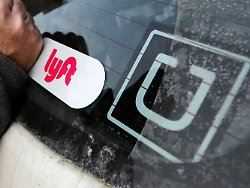A judge in California questions the Uber and Lift business model. He thinks: The driving service agents should not treat their drivers like subcontractors, but like employees. Actually, the two companies therefore want to stop their services in the state. But it turns out differently.
Vehicle service providers Uber and Lyft have achieved a stage victory in their legal battle in California over the status of their drivers. An appeals court in the US state overturned a lower court order that the two companies should treat their drivers as employees from Friday.
Uber and Lyft then announced at the last minute that they would not cease their services in California on Friday night (local time) as planned. Uber was "happy" that it could continue its services and the drivers could continue to work with their previous "freedom", the company said.
Uber and Lyft have been treating their drivers like freelancers so far. The California attorney general Xavier Becerra sued both companies in May. By being classified as self-employed, drivers would wrongly withhold benefits such as a minimum wage, paid overtime, sick pay and unemployment insurance, he argues.
The California cities of Los Angeles, San Diego and San Francisco are also involved in the lawsuit. It is based on a law that came into force in the state at the beginning of the year, which in certain cases re-classifies the self-employed as employees.
The Court of Appeal's ruling has now suspended the application of the law to Uber and Lyft until further notice. However, the court demanded affidavits from the companies that they would comply with the original order to classify their drivers as employees, should this be confirmed in the further course of the litigation – and should the new law serving as the basis not in a referendum planned for November be tilted.
The outcome of the litigation has the potential to have implications well beyond California. Ultimately, it affects the entire model of the so-called gig economy, in which online companies repeatedly award small contracts to freelancers at short notice. Uber and Lyft argue that this way drivers could make money whenever they wanted and would have great independence and flexibility.
. (tagsToTranslate) Economy (t) Uber – driver service broker
